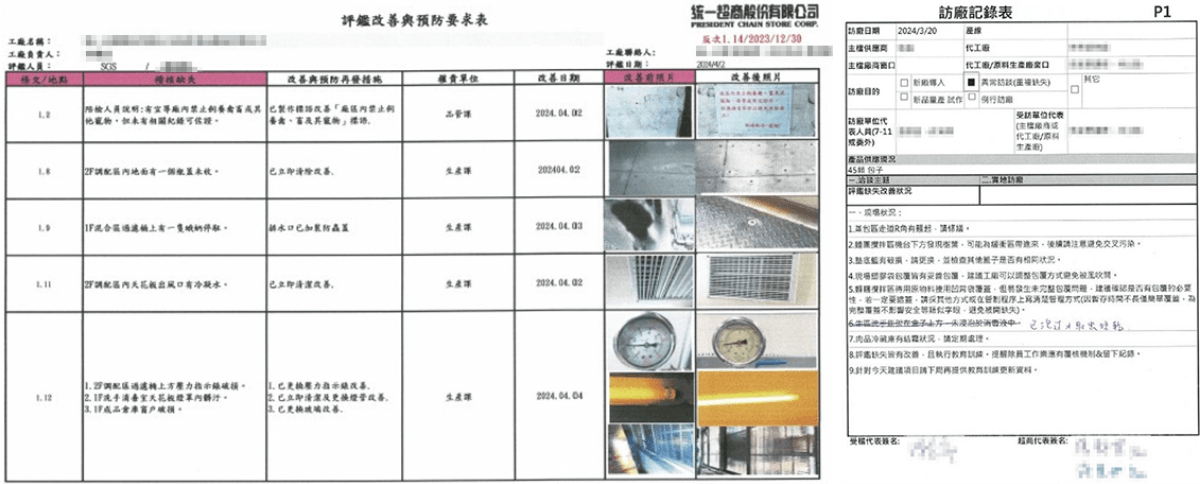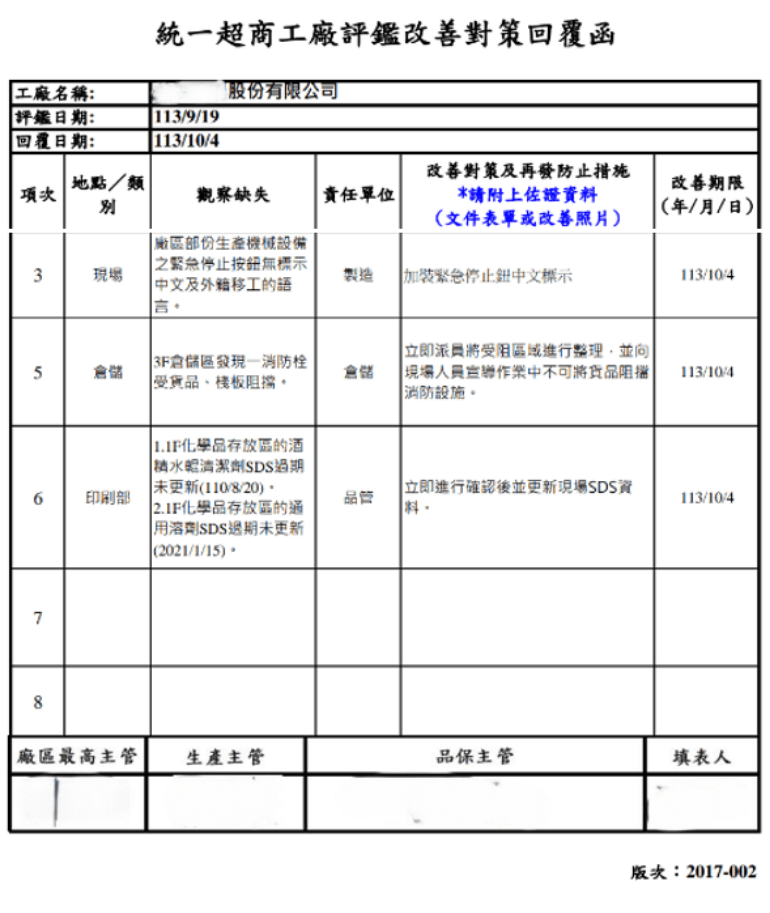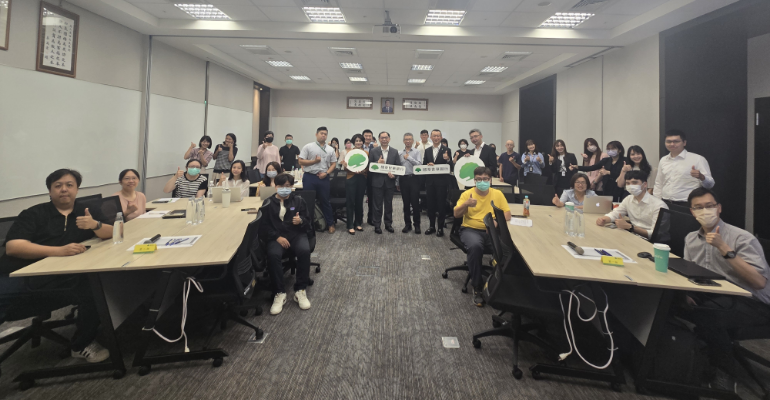President Chain Store Corporation’s supplier management structure follows the spirit of ISO 20400 Sustainable Procurement Guidance to formulate the overall management process as shown in the figure below. The organization sets up a comprehensive management structure from top to bottom, and implements grading, screening and evaluation of suppliers to subsequent corrective action plans.
Supplier Management Policy
President Chain Store Corporation hopes to make itself the benchmark in the local retail industry by encouraging suppliers to practice corporate social responsibility. We have revised the “President Chain Store Corporation and President Chain Store Corporation’s Subsidiaries’ Code of Conduct for Suppliers” based on the United Nations Global Compact (UNGC) and UN Guiding Principles (UNGPs), as well as taking ISO 20400 Sustainable Procurement Guidance into consideration with requirements for suppliers’ performance in Environment, Social and Governance. Suppliers are required to sign an “Agreement on Ethical Corporate Management and the Corporate Social Responsibility,” and their compliance with the guidelines are taken into consideration when evaluating cooperation and contract renewal to ensure suppliers understand and commit to complying with our supply chain management requirements.
To implement the principle of ethical corporate management and enhance supply chain compliance awareness, the Company has established the "Supplier Ethical Management Guidelines" The guidelines cover the principle of ethical corporate management, operating procedures and code of conduct, anti-corruption and anti-bribery regulations, as well as grievance and reporting channels. Through ongoing promotion and training, we aim to work with our suppliers to create a fair, transparent, and integrity-driven business environment, fulfilling our commitment to sustainable operations.
Supplier Screening and Identification
Supplier Screening
In order to distinguish the level of priority for supplier management, we adjusted the definition in 2024 based on the annual procurement amount, transaction necessity and ESG risks, as well as taking the specific risks regarding countries, industries or products into consideration to identify significant suppliers, so as to enhance control of significant suppliers. The detailed definitions are as follows.
| Definition of significant suppliers (if any of the following applies) |
| Procurement Amount |
Top 80% suppliers in terms of annual procurement amount |
| Necessity of Transactions |
- Long-term partners
- Affiliated companies
- Oligopoly or monopoly
|
| ESG Risks |
- Environmental risks (such as violations of environmental regulations)
- Social risks (such as occupational safety and human rights incidents)
- Governance risks (such as violations of business ethics)
|
- Risks by country (such as the impact of local regulations on cross-border procurement of raw materials)
- Industry risks (such as food safety)
- Product risks (such as the use of resources such as packaging materials)
|
New Supplier Screening and Assessment
We set our standards based on the relevant legal conditions, quality certification, management systems, and tracebility of materials of new suppliers.
Supplier Appraisal System
Desk Assessment
To gain a deeper understanding of the sustainable development of significant suppliers, President Chain Store Corporation handed out a supplier sustainability assessment questionnaire in 2024, referencing sustainable rating and points items for auditing such as the Dow Jones Sustainability Index (DJSI) and BSCI (Business Social Compliance Initiative), and including ESG aspects in the scope of assessment for significant suppliers.
On-site Assessments
Supplier assessment items are based on the characteristics of the manufacturer, supplier of raw materials by direct transaction, egg product supplier or supplier of store supplies. Environment, social, and governance (ESG) are all included in the assessment, comprising management systems, environmental sanitation, process and quality assurance. The aforementioned items for inspection ensure that product safety and organizational operations are well-managed.
Please refer to the 2024 Sustainability Report for the annual performance of desk and on-site assessments.
Supplier corrective action/improvement plans
The rules state that existing manufacturers failing to qualify in the overall evaluation must submit a review report. In addition to requiring suppliers to provide feedback on improvement actions after the evaluation, knowledge-sharing and case-by-case response will be given through raw material sub-committee or production quality control meetings, with the hope of reducing and avoiding recurrence of such deficiencies. Meetings, discussions during unspecified site visits or video and other communications targeting the issues will be held to focus on the improvement, ensuring the factories can improve defects within a specific timeframe. Subsequent meetings/site visits will be held. Alternatively, the improvement will be verified during the next audit.
 The factory corrective/improvement actions schedule and the factory on site visit records
The factory corrective/improvement actions schedule and the factory on site visit records
 Supplier corrective action/improvement plans
Supplier corrective action/improvement plans
Supplier Development and Empowerment
President Chain Store Corporation actively conducts supplier training and capability building programs by providing suppliers with ESG forums, guidance for management system incorporation such as ISO 45001, introduction of certified sustainable raw materials, examples of peers with excellent ESG performance for benchmarking, as well as working with suppliers on promoting ESG services with key technologies.
Supplier information/trainings on company's supplier ESG program
President Chain Store Corporation provides suppliers with information on the company's supplier ESG program through the following channels:
- Provide suppliers with information on the integration of sustainable raw materials to align with President Chain Store Corporation's sustainable procurement goals.
- Organize supplier agreement meetings to promote awareness of labor safety issues among store maintenance and operations contractors.
- Compiled promotional materials on sustainability trends and importance to raise awareness of the importance of sustainability to non tier-1 suppliers.
Supplier access to ESG benchmarks
President Chain Store Corporation worked with Cathay United in 2024 to organize the “Carbon Reduction and Circular Economy Exploration Workshop,” joining hands with 12 raw material and food processing companies in the supply chain to discuss the practical analysis and case study of low-carbon transformation and circular economy. 100% of the workshop participants believe that investing in circular economy will help with low-carbon transformation, and that recycling will bring new opportunities for enterprises to “reduce carbon/waste,” “enhance competitiveness” and “operate sustainably.” The workshop also helped supply chain manufacturers review the current status of their own business operations and reflect on the transition opportunities that can be integrated into circular economy in the current production process, divided into three aspects of raw materials and by-products, water and packaging. The collaboration will carry on with sustainable supply chain workshops for fresh food manufacturers, helping to negotiate mergers and explore feasible sustainable supplier project opportunities, promoting circular economy transformation of the supply chain. Yuland Biological Agriculture was also invited to share cases of promoting circular economy in the current supply chain, providing examples of sustainable supply chain cooperation for fresh food manufacturers, assisting with negotiating mergers and exploring feasible sustainable supplier project opportunities to facilitate circular economy transformation of the supply chain.

In-depth technical support programs
In April 2025, President Chain Store Corporation partnered with CommonWealth Magazine’s Sustainability Council to host the “Sustainable Value Chain – ESG Advancement Workshop.” The event aimed to explain the CommonWealth Magazine’s “Sustainable Citizenship Evaluation” and its related assessment criteria to suppliers, inviting them to participate in ESG evaluations. As part of a long-term initiative to enhance suppliers’ sustainability performance, the workshop also featured experts who discussed key topics in sustainable supply chain development, such as greenhouse gas inventory and circular economy case studies, thereby empowering suppliers in their sustainability journey.